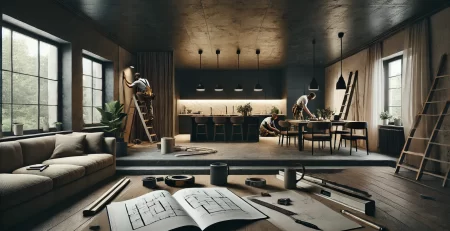From Concept to Completion: What to Expect When Working with Home Renovation Contractors Near Me
Introduction
Renovating your home can be one of the most exciting yet challenging experiences. Whether you’re expanding your living space with a home addition, transforming your basement into a functional area, or giving your kitchen a modern upgrade, working with professional home renovation contractors can help turn your vision into reality. However, understanding the process from start to finish is crucial for smooth execution.
In this comprehensive guide, we’ll walk you through what to expect when working with home renovation contractors near Rochester, MI, and the stages of a typical renovation project. We will also explore popular renovation types, including basement remodeling, kitchen remodeling, bathroom remodeling, and building decks. By the end, you’ll have a clear understanding of what each phase entails and how to make informed decisions at every step of the journey.
1. Initial Consultation and Planning
The renovation process begins with the initial consultation. This first meeting sets the stage for your project and allows both you and your contractor to get on the same page. Whether you’re planning a home addition or basement remodeling, this phase is crucial to ensure a successful renovation.
a. Defining Your Goals and Vision
The first thing a contractor will do is understand your vision for the space. Are you looking for a kitchen remodel to increase storage or a luxurious bathroom remodel to enhance comfort? It’s important to be clear about your goals, as this will shape every decision moving forward.
Some questions to consider:
- What is your budget?
- What is your preferred timeline?
- What specific features do you want in your renovation (e.g., open-concept kitchen, home office addition, etc.)?
- Are there any challenges in your current space you’d like to address?
b. Site Evaluation and Measurements
After the initial discussion, the contractor will likely visit your home for a site evaluation. During this visit, they will:
- Measure the existing space
- Identify potential structural issues or limitations
- Discuss design possibilities that fit within your budget and goals
For example, if you’re considering basement remodeling, the contractor will inspect the basement for factors like ceiling height, moisture issues, and existing plumbing or electrical systems. For a home addition, they will evaluate your property’s structure and foundation to ensure it can support the new addition.
c. Design and Drafting
Once the evaluation is complete, the contractor will create a detailed design plan. This plan includes architectural drawings, 3D renderings (if applicable), and material options. Your contractor may also bring in specialists, such as an architect or interior designer, to assist in finalizing the design.
During this phase, you’ll review:
- The proposed layout
- The materials and finishes (e.g., countertops, flooring, cabinets)
- A preliminary timeline and budget estimate
2. Permits and Approvals
Before any physical work begins, you’ll need to secure the necessary permits. Home renovation contractors in Rochester, MI, are familiar with local regulations and will handle most of the permit applications on your behalf.
a. Importance of Permits
Whether you’re planning a home addition, building a deck, or remodeling your kitchen or bathroom, permits ensure the work is safe and meets all building codes. Renovating without the proper permits can lead to significant fines or even having to tear down the completed work.
Common permits include:
- Building permits for structural changes
- Electrical permits for wiring
- Plumbing permits for modifications to pipes or water lines
b. Timeline for Permit Approval
The approval process can take anywhere from a few days to a few weeks, depending on the complexity of your project. Working with home renovation contractors who are experienced in the Rochester, MI, area will help streamline this process.
3. Demolition and Preparation
Once the permits are in hand, the physical work begins. The first step in any major renovation, whether it’s a basement remodel or a bathroom renovation, is demolition.
a. Demolition Phase
During this phase, contractors will:
- Remove old materials (e.g., cabinets, countertops, flooring)
- Knock down walls or remove existing structures (if needed for a home addition)
- Clear out the space to prepare it for new construction
If you’re remodeling a kitchen or bathroom, this phase can be particularly messy. Protecting your home from dust and debris is a priority, and professional contractors will use barriers and other measures to minimize disruption.
b. Structural Adjustments and Site Preparation
After demolition, the contractor may need to make structural adjustments. For example, in a kitchen remodel, this could involve relocating plumbing or electrical lines to accommodate new appliances or fixtures. For a home addition, the contractor may need to reinforce the foundation or adjust framing.
If you’re working on a basement remodel, this phase often involves waterproofing the basement to prevent future moisture problems.
4. Rough Construction
With the site prepped and cleared, rough construction begins. This is when the bones of your renovation take shape, and you’ll start to see your project come to life.
a. Framing and Structural Work
In the case of a home addition, the contractor will build the framing, which includes the walls, roof, and floors. For a deck installation, this phase includes building the frame that supports the deck.
b. Electrical, Plumbing, and HVAC Rough-In
This phase also includes the rough installation of essential systems, such as electrical, plumbing, and HVAC. For example, during a bathroom remodel, the contractor will install new pipes for sinks, showers, and toilets, as well as any new wiring for lighting and outlets.
In a basement remodel, you may also want to add new heating or air conditioning systems to make the space more comfortable. It’s crucial to have skilled home renovation contractors who are licensed to handle these intricate systems.
c. Inspections
Once the rough construction is complete, local building inspectors will review the work to ensure everything meets code. Inspections typically cover structural elements, electrical systems, and plumbing. Passing these inspections allows the project to move forward to the next stage.
5. Finishing Construction and Detailing
After the rough construction is inspected and approved, the finishing phase begins. This is where the aesthetics of your renovation come together.
a. Drywall, Insulation, and Flooring
For home additions, new walls are insulated and drywalled. For projects like basement remodeling, this phase includes insulating the walls and ceiling to keep the space comfortable year-round.
Once the drywall is installed and sanded smooth, the contractor will move on to flooring. You’ll choose materials such as hardwood, tile, or carpet, depending on the room’s function. Kitchen remodeling projects might include durable tiles, while bathroom remodeling often features water-resistant materials like porcelain or vinyl.
b. Painting and Trim Work
With the walls finished, painting begins. You’ll have the opportunity to select colors that align with your design vision. Trim work, including baseboards, crown molding, and window casings, is also installed to add a polished, professional look to the space.
For deck installations, this phase includes applying a weatherproof coating or stain to protect the wood and give it a beautiful finish.
6. Installing Fixtures and Appliances
With the structure in place and the finishing touches underway, the next step is installing fixtures, appliances, and cabinetry.
a. Cabinetry and Countertops
If you’re undertaking a kitchen remodel, this phase is when the contractor installs new cabinets, countertops, and other storage solutions. For bathroom remodeling, you’ll see vanities and countertops fitted into place.
b. Lighting, Plumbing, and Appliances
The contractor will also install light fixtures, faucets, sinks, and other plumbing elements. This phase is especially important for kitchen and bathroom remodels, where functionality is key.
For a basement remodel, you might be adding a wet bar, home theater, or extra bathroom, which requires additional plumbing and electrical installations.
c. Final Electrical and HVAC Installations
Finally, contractors will install electrical outlets, light switches, and any heating or cooling units. In a home addition, this might involve extending your current HVAC system to service the new space.
7. Final Inspections and Walkthrough
Once the finishing touches are complete, it’s time for the final inspections and walkthrough. This ensures that everything meets building codes and your specifications.
a. Final Inspections
A local inspector will visit your home to conduct the final review. This ensures that the renovation complies with all building codes, and the inspector will sign off on the work before you can fully use the space.
During this phase, the inspector will focus on:
- Electrical systems: Ensuring all wiring and outlets are properly installed
- Plumbing systems: Verifying that all pipes, faucets, and drains function correctly
- Structural integrity: Checking that all new structures (like walls and decks) are stable and secure
b. Client Walkthrough
After passing the final inspection, your contractor will walk you through the completed project. During the walkthrough, you’ll review the work to ensure it meets your expectations. If you spot any issues, such as a misaligned fixture or a minor paint flaw, the contractor will address them before finalizing the project.
This walkthrough is your opportunity to ask any last-minute questions about your renovation, whether it’s how to maintain your new deck or advice on keeping your kitchen countertops in top condition.
8. Post-Completion Support and Warranties
A professional contractor doesn’t just disappear after the work is done. Many home renovation contractors in Rochester, MI offer post-completion support to ensure you’re satisfied with the results.
a. Warranty on Workmanship and Materials
Most contractors offer warranties that cover both the workmanship and materials used in your renovation. For instance, a warranty might cover issues like peeling paint, faulty wiring, or improperly installed cabinets.
Be sure to review the terms of your warranty with your contractor to understand what is and isn’t covered.
b. Maintenance Tips and Recommendations
In addition to warranties, your contractor may provide maintenance advice. For example, they may recommend specific products for cleaning your bathroom tiles or sealing your deck annually to keep it in good shape.
Conclusion: What to Expect from the Best Home Renovation Contractors in Rochester, MI
Working with experienced home renovation contractors in Rochester, MI, ensures that your project runs smoothly from concept to completion. Whether you’re planning a home addition, upgrading your kitchen, or transforming your basement, a professional contractor will guide you through each stage of the renovation process with expertise and care.
By understanding what to expect, you can approach your renovation with confidence, knowing that every detail is in capable hands. From initial consultation to the final inspection, hiring the right contractor is key to creating the home of your dreams












Leave a Reply